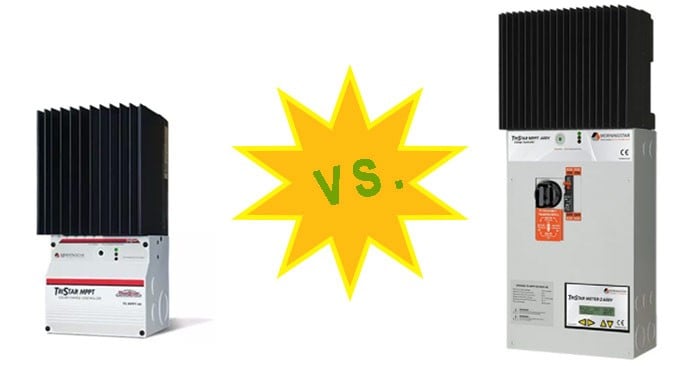When assessing which type of solar charge controller to purchase, you need to know about their functionality and features but it’s also helpful to see a straightforward comparison of your options. To that end, we’ve put together a comprehensive look at the pros and cons of both and for your convenience!
If you’re just starting out, you may want to review How Charge Controllers Work and Increase Solar Charging with an MPPT Charge Controller.
Pros of PWM Charge Controllers
- PWM charge controller are built on a time tested technology . They have been used for years in PV systems and are well established.
- These charge controllers are inexpensive , usually selling for less than $250.
- PWM charge controllers are available in sizes up to 60 amps.
- PWM charge controllers are durable, most with passive heat sink style cooling.
- These charge controllers are available in many sizes for a variety of applications.
Cons of PWM Charge Controllers
- The PV input nominal voltage must match battery bank nominal voltage if you’re going to use PWM.
- There is no single controller sized over 60 amps DC as of yet.
- Many smaller PWM charge controller units are not UL-listed.
- Many smaller PWM charge controller units come without fittings for conduit.
- PWM charge controllers have limited capacity for system growth.
Pros of MPPT Charge Controllers
- MPPT charge controllers offer a potential increase in charging efficiency up to 30%.
- These charge controllers also offer the potential ability to have array with higher input voltage than battery bank.
- You can get sizes up to 80 amps.
- MPPT charge controller warranties are typically longer than PWM units.
- MPPT offer great flexibility for system growth.
Cons of MPPT Charge Controllers
- MPPT charge controllers are expensive, sometimes costing twice as much as a PWM controller and are certainly more expensive than PWM controllers.
- MPPT units are generally larger in physical size.
- Sizing an appropriate PV array can be challenging without MPPT charge controller manufacturer guides.
- Using an MPPT controller forces the PV array to be comprised of like photovoltaic modules in like strings.



